Culture Watch
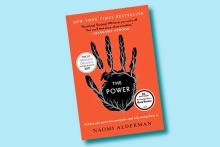
THE POWER IS THE fourth novel by Naomi Alderman, protégé of award-winning author Margaret Atwood (The Handmaid’s Tale). It centers on the discovery among the world’s women that they have a unique muscle, called a “skein,” embedded into their skin that when activated gives them an electric power that they can use to both hurt and heal.
The story is told through the narration of four protagonists—Tunde, Allie, Margot, and Roxy. Tunde is a journalist who provides the reader a global perspective on overturned social orders and flipped cultural norms through his travels. Allie gives us a glimpse into the religious order forming around women and lightning. Margot is the mayor of an undisclosed U.S. city and walks the reader through the governmental and political consequences of the power. Roxy’s involvement in organized crime affords the perspective of people leveraging a new social order for financial gain.
Alderman explores in depth the role reversals between men and women. Gender-based power structures and assumptions of the previous order do not last as more women discover the power within themselves. Alderman creates a world in which men are seen as less-than, echoing stereotypes that burden women in our world: “Men are dangerous ... Men are less intelligent, less diligent, less hard-working ... Men are more likely to suffer from diseases and they are a drain on the resources of the country.”
Does this novel depict a dystopia or a feminist utopia?

I’m inspired and troubled by the stories I have heard.
In the blue light of evening all boundaries get blurred.
And I believe in something better, and that love’s the final word,
And that there’s still something whole and sacred in the world.
—“Help in Hard Times,” by Carrie Newcomer
CARRIE NEWCOMER IS a Quaker singer-songwriter whose music is inspired by hope and the great human potential for peaceful coexistence. The Beautiful Not Yet is the title of both her newest album (Available Light Records) and an accompanying book of poems, essays, and lyrics. She is also working on a spoken word and music collaboration with Parker J. Palmer (author of Let Your Life Speak and Healing the Heart of Democracy) called “What We Need Is Here: Hope, Hard Times, and Human Possibility,” which is scheduled to premiere in spring 2017.
Newcomer lives in southern Indiana when she’s not traveling the world singing her folk and gospel-infused tunes and engaging social and environmental justice issues.
She was interviewed for Sojourners by John Malkin, a musician, journalist, and radio host in Santa Cruz, Calif., whose books include Sounds of Freedom: Musicians on Spirituality and Social Change and The Only Alternative: Christian Nonviolent Peacemakers in America.
John Malkin: When did you start making music?
Carrie Newcomer: I picked up a guitar when I was in my early teens and learned my first three chords and started writing songs. I’ve always loved the combination of language and music.
In the liner notes of The Beautiful Not Yet, you mention that many of these songs were written on trains and planes. How has travel been a part of your life and music?
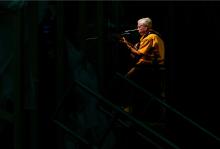
IF YOU WRESTLE WITH ANGELS, you will end up with a limp. When you struggle with God, engage the divine in lament-filled argument, cry out to the Creator for justice, hang on and refuse to let go without a blessing, you’ll end up with a posture bent over from the struggle and an uneven gait. Just watch Bruce Cockburn come onstage and you’ll see what I mean.
Known for hits such as “Wondering Where the Lions Are” (from the album Dancing in the Dragon’s Jaws), “Rocket Launcher,” and “Lovers in a Dangerous Time” (both from Stealing Fire), Cockburn’s evocative lyrics, exquisite guitar virtuosity, and unique blend of folk, jazz, and rock has brought him numerous awards and accolades over the years. More than 30 albums and close to a half century of touring would take its toll on anyone.
But there is more going on in the career of this Canadian singer-songwriter. The quiet Christian spirituality discerned in some of his early work was broken open in the 1980s when he first visited Central America. Revolutions and dirty wars in Nicaragua, El Salvador, and Guatemala opened his eyes to U.S. imperialism and the oppressive structures of global capitalism. Looking further abroad he became an advocate for ecological justice and the international banning of land mines. Closer to home Cockburn has railed against white nationalism married to the Religious Right while also passionately embracing the cause of Indigenous justice.
We haven’t heard much from Cockburn over the last few years. Writing his 2014 memoir, Rumours of Glory, took up so much creative energy that songwriting dried up for a while. But the muse returned, and the result is a new album, evocatively titled Bone on Bone: A reference on one level to the arthritis that afflicts Cockburn (though his guitar playing is still stunning), but perhaps more so to the wear and tear of a life of pilgrimage and a spirituality of resistance.

REV. OSAGYEFO Uhuru Sekou’s album In Times Like These does something I’ve never witnessed any other recorded musical project do: It sings before track one even begins. Printed on the inside of the album’s CD case is one of the most powerful commentaries on the 2016 U.S. presidential election I’ve read. “The Task of the Artist in the Time of Monsters,” written by Rev. Sekou, is simultaneously an artist statement, a poem, and a call to action for the world to engage passionately in “the art of loving and living.”
Sekou’s album is a rousing sermon that may re-energize social justice activists who listen to it, keeping them engaged in “the movement.” At the same time, it’s also an extended prayer of sorts, lamenting the wrongs of the world and asking God to alleviate society’s pains. “In times like these / we need a miracle,” Sekou sings in the chorus of the album’s title track, one of the project’s standouts.
However, despite his call for divine intervention, Sekou doesn’t allow believers in a higher power to sit back and rest assured that God will do the work they should be doing. He completes the chorus of the song “In Times Like These” with the much-appreciated but potentially controversial statement: “Ain’t nobody gonna save us / We the ones we’ve been waiting for.” In a time that calls for bold, social justice-minded commentary from artists, Sekou delivers.
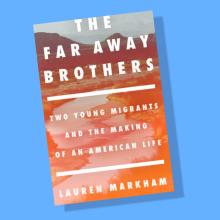
WITHIN THE FIRST pages of The Far Away Brothers: Two Young Migrants and the Making of an American Life , it becomes clear that Lauren Markham understands the complexities of immigration to the United States and has personally worked with immigrants stuck in its tangled web. In a journalistic style, she reports the story of teenage twin brothers Raúl and Ernesto, fleeing gang violence in El Salvador, hoping to find safety and new opportunities in El Norte.
Markham has worked in refugee resettlement and immigrant education for the past decade. In this book she covers all aspects of immigration in well-researched detail. But she also seems to understand that while any reader could argue immigration policy, no one can argue with the Flores brothers’ story, from the crippling poverty in rural El Salvador, where life is cheap and disposable, to the stark loneliness of their lives in the U.S., far from the comforts of family and home.
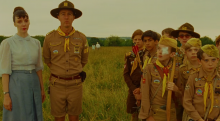
Actor and writer Dylan Marron is the creator of Every Single Word, a popular tumblr and video series dedicated to exposing the lack of racial diversity in mainstream Hollywood films.
For the series, Marron, a biracial native of Venezuela best known for his work on the cult-favorite podcast Welcome to Night Vale, chooses a well-known, recent film and edits it down to only the lines spoken by people of color. The results are damning. None of the videos in Marron’s series last over a minute. Some, like Noahand Into the Woods, which feature no actors of color at all, simply cut directly to black.
Marron spoke with Sojourners about the origins of the project, the long-term effects of poor diversity representation onscreen, and systemic struggles facing people of color in the entertainment industry.
 As we reflect on the history, meaning, and mythologies surrounding the season of Thanksgiving, indigenous theologians Richard Twiss, Raymond Aldred, and Terry LeBlanc offer their perspectives on the interaction between Christian faith and Native American identity, and how religions, culture, and the Gospel interact.
As we reflect on the history, meaning, and mythologies surrounding the season of Thanksgiving, indigenous theologians Richard Twiss, Raymond Aldred, and Terry LeBlanc offer their perspectives on the interaction between Christian faith and Native American identity, and how religions, culture, and the Gospel interact.
[Continued from part 1] I began to wonder what the TBN folks would think of me, a heavily tattooed Christian progressive from a liturgical denomination. How would people in their theological camp respond to my preaching? Would they think, as I do of them, that I misuse scripture?
To say that Christian television is "not my thing" doesn't even get close.
The number one film at the U.S. box office this past weekend was Lakeview Terrace, Neil La Bute's somewhat thoughtful thriller in which an LAPD officer harasses his new neighbors; the cop is black, the neighbors are an inter-racial couple. If the ethnic identities were switched, the film might never have been made; and if it had, it would have been a far less interesting film -
On Sept. 4, I'm going to Philadelphia to attend the premiere of The Ordinary Radicals, a documentary directed and produced by Jamie Moffett, co-founder of The Simple Way. The trailer gives a sense of this project.
While I can't speak for the others who were interviewed for this film, I felt my role was to serve as a cheerleader [...]

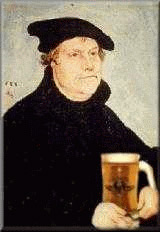 One of the great recent joys of my life has been a thing called "Beer and Bible," which happens every other Tuesday night at a small neighborhood pub in Memphis called, appropriately enough, Kudzu's. Kudzu, our bar's namesake, is the South's most [...]
One of the great recent joys of my life has been a thing called "Beer and Bible," which happens every other Tuesday night at a small neighborhood pub in Memphis called, appropriately enough, Kudzu's. Kudzu, our bar's namesake, is the South's most [...]
 Jarrod McKenna's post on the 1968 Olympics witness/protest brought back memories of that event, and the impression it made on me. And there is a sequel to the story.
Jarrod McKenna's post on the 1968 Olympics witness/protest brought back memories of that event, and the impression it made on me. And there is a sequel to the story.
 Jarrod McKenna's post on the 1968 Olympics witness/protest brought back memories of that event, and the impression it made on me. And there is a sequel to the story.
Jarrod McKenna's post on the 1968 Olympics witness/protest brought back memories of that event, and the impression it made on me. And there is a sequel to the story.